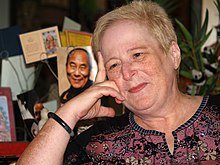Eve Kosofsky Sedgwick
Jump to navigation
Jump to search

Eve Kosofsky Sedgwick (May 2, 1950 – April 12, 2009) was an American professor of English and an author in gender studies, lesbian and gay studies, queer theory and critical theory.
Sourced[edit]
- With respect to the homosocial/homosexual style, it seems to be possible to divide Victorian men among three rough categories according to class. The first includes aristocratic men and small groups of their friends and dependents, including bohemians and prostitutes; for these people, by 1865, a distinct homosexual role and culture seem already to have been in existence in England... It seems to have constituted a genuine subculture, facilitated in the face of an ideologically hostile dominant culture by money, privilege, internationalism, and for the most part, the ability to command secrecy... This role is closely related to — is in fact, through Oscar Wilde, the antecedent of — the particular stereotype that at least until recently has characterized American middle-class gay homosexuality; its strongest associations, as we have noted, are with effeminacy, transvestism, promiscuity, prostitution, continental European culture, and the arts.
- Between Men: English Literature and Male Homosocial desire (New York: Columbia University Press, 1985), pp. 172-173
- I've heard of many people who claim they'd as soon their children were dead as gay. What it took me a long time to believe is that these people are saying no more than the truth. They even speak for others too delicate to use the cruel words.
- Tendencies (Duke University Press, 1993), p. 2
- Seemingly, this society wants its children to know nothing; wants its queer children to conform or (and this is not a figure of speech) die; and wants not to know that it is getting what it wants.
- Tendencies (Duke University Press, 1993), p. 3
- One of the things that 'queer' can refer to: the open mesh of possibilities, gaps, overlaps, dissonances and resonances, lapses and excesses of meaning when the constituent elements of anyone's gender, of anyone's sexuality aren't made (or can't be made) to signify monolithically.
- Tendencies (Duke University Press, 1993), p. 8
